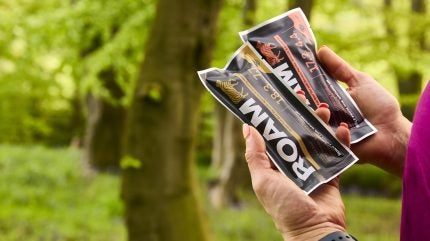
With protein available in numerous formats and across multiple categories, it can be difficult for consumers to see the wood for the trees but Matthew McEntegart, co-founder of UK challenger brand Roam, believes it is possible to make a case for meat snacks being top of the protein pecking order.
His business, based north of London and launched in 2022, has brought out products encompassing funky flavours and offering white meat alternatives in a category dominated by red meat. But he suggests the most important differentiator is that the products are clean-label.

Discover B2B Marketing That Performs
Combine business intelligence and editorial excellence to reach engaged professionals across 36 leading media platforms.
He told Just Food’s Andy Coyne about the company’s ethos and the challenges it has faced.
Andy Coyne (AC): Matt, you’ve just launched a turkey-based meat snack – the Lemon & Herb Free-Range Turkey Bar – building on a pork-based product that’s already out in the market. This is a category traditionally dominated by red meat products. Why have you gone down the white meat route?
Matthew McEntegart (MM): “We had a four signature grass-fed beef bars and we started looking at a white meat product. Pork is a very tasty meat and we looked at some of the flavours we could create with that. The new turkey bar is the only ambient white meat product you can get hold of [in the UK]. You see far more in the US. Turkey and chicken are seen as lean meat and we’ve only got very low quality sliced chicken and turkey products in the UK. They are formed and have preservatives. There are 13g of protein in the pork bar. The turkey one has 17g of protein in a 45g bar with just 99 calories and it can be kept for 12 months. All of the early indications are that it will be a very popular product.
AC: Why is red meat so dominant in meat snack bars?
MM: Every manufacturer has food safety protocols. Perhaps there has been a fear about poultry from a salmonella perspective.
AC: How did you get into all this?
MM: I was a semi-pro footballer. My co-founder at Roam, Allan Russell, was also employed as a coach. I played for a lot of lower league teams such as Kidderminster Harriers and Forest Green Rovers. I always had that sporting side to me. I loved being in the gym and running.

US Tariffs are shifting - will you react or anticipate?
Don’t let policy changes catch you off guard. Stay proactive with real-time data and expert analysis.
By GlobalDataWhen playing part-time, I studied as a nutritionist and set up my own practice. I found myself cooking for top level [football] players. I’m a pretty decent, self-trained cook but I was working incredibly long days. I could be travelling from London to Newcastle [in England’s north-east] to cook for a player. I found a lot of food I was eating on the go was synthetic. I thought there has to be a real food alternative option with some nutritional profile. That led me to thinking of a meat snack that is very functional but with no preservatives.

AC: With no manufacturing experience, what obstacles did you face?
MM: We started developing the product but it took two years to set up the manufacturer and the supply chain. And then it was Covid, so great timing. It almost put the manufacturer we had just found out of business. They [the manufacturer] put us on the back burner massively. We were a new customer and they had got big existing customers. You can get de-prioritised very quickly. We also couldn’t get the product right in the early stages. We couldn’t get it stable and consistent. It is very challenging to get it right.
I believe, and scientific research backs it up, that animal protein sources hold the key to human health
AC: Protein, either natural or added, is an incredibly crowded field with snack bars and shakes to the fore. Why meat snacks?
MM: We are big proponents of bringing back foods people have eaten for generations and moving away from faddy foods. We are against binders, fillers, anti-caking agents, stuff that is used in a lot of [snack] bars. We wanted it to be all natural. When you look at meat consumption going down, people aren’t getting any healthier so there’s always a big education piece to do for us. Not all protein is created equal. It is about getting enough each day but when you eat beef, for example, you get not just protein but vitamin B12, iron, zinc, essential acids. It’s becoming very clear that these are the nutrients that support human health. People need to eat more nutrient-dense food. I believe, and scientific research backs it up, that animal protein sources hold the key to human health. You can’t get the same nutrients in other food.
AC: You make the point that your turkey bar is free from sodium nitrate, a common preservative used in meat snacks that has been linked to colon cancer. Meat snack bars have a reputation for being pricey compared to other forms of protein. Presumably being clean-label has contributed to your price-point of around £3.25 ($4.19) a bar.
MM: It is an expensive product to make and the margins are not glamorous. I’ll buy a double espresso for £2.50 or more whereas online you can get our bars for less than that if you buy them in a bundle.
AC: Tell me about your distribution model.
MM: Up until Q4, 2024, we didn’t engage in any retail but focused our efforts on D2C. When we started we had never sold a product online. We’ve always been very active on social media and became very active on Amazon. That’s where we grew it. We have got one fulfilment centre in the UK and one in Berlin so we could ship to 16 European countries. We couldn’t ship from the UK. Because it’s an animal-based product, it becomes a nightmare because of customs etc. We had some demand from Europe so launched a fulfilment centre there. Fifty per cent of the growth in meat snacks is expected to be from the UK and central Europe in the next five years.
AC: What about retail?
MM: We’ve now got a head of retail sales and we’re in health food stores, specialist grocery chains etc., as well as gyms. We are also having discussions with big grocers and we’re hopeful that we will get listings this year.
AC: Have you sought external investment?
MM: We have got external investment into the business. We funded it ourselves in the beginning for quite a long time from the profits of a sports performance business we had. The first round of investment was at the end of 2023 and the following one last year. They were pre-seed and seed really. We’re looking to raise money again in the second half of this year.
AC: How are your sales progressing?
MM: We grew revenues by 300% last year with two additional products. We’re looking to double that again this year at minimum with another four products, two of which have already been launched.
AC: You’ve chosen some pretty out-there flavours for your meat snacks, including apricot and hazelnut, chilli and smoked paprika, cranberry and almond. What’s your thinking?
MM: We came up with ten initial flavours and then narrowed it down. We wanted to try and deliver four different flavours – smoky, heat, a sweet one and umami. But that wasn’t the way we wanted to differentiate ourselves. Clean-label is the differentiator. Clean eating is going to be the biggest trend in health and fitness.



